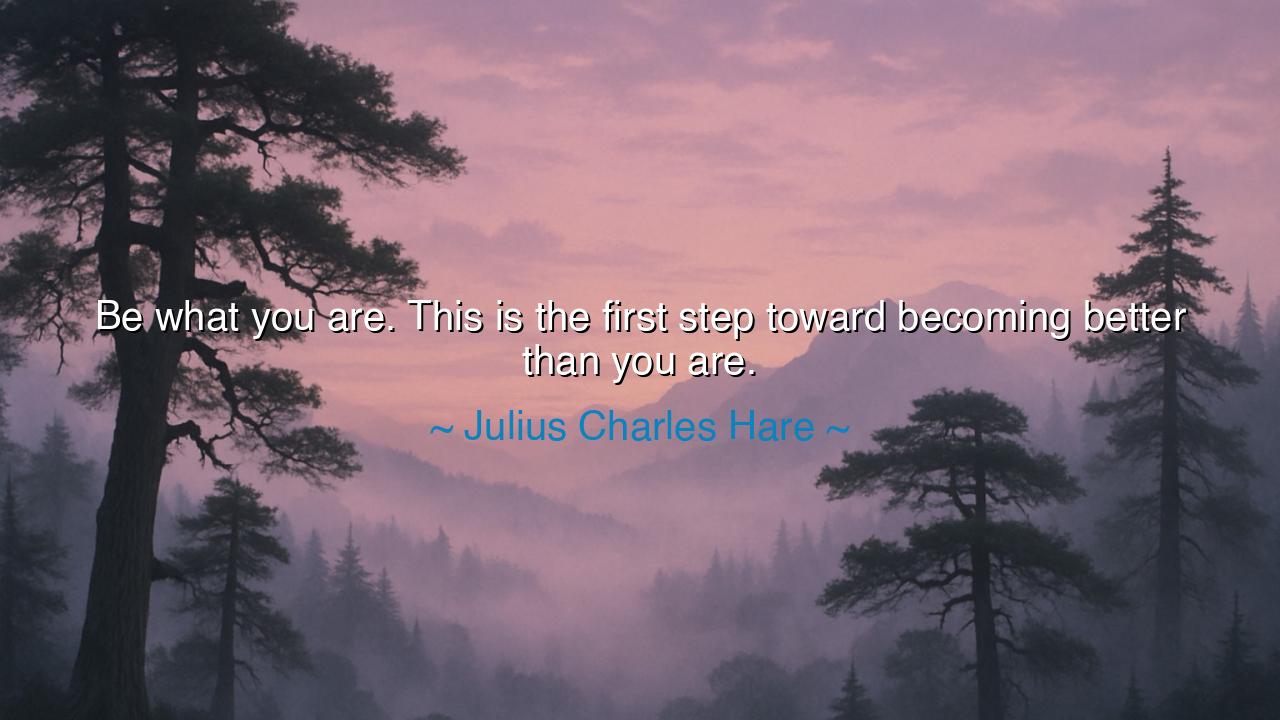
Be what you are. This is the first step toward becoming better






“Be what you are. This is the first step toward becoming better than you are.” — Thus spoke Julius Charles Hare, the English divine and moral philosopher, whose words flow like quiet truth drawn from the deep well of the soul. In this brief yet radiant saying lies a timeless wisdom: that self-knowledge is the beginning of all growth, and that no man can rise to greatness by wearing a mask. The first step toward transformation is honesty — to stand unhidden before oneself, stripped of pretense, and to see clearly what one is, both light and shadow. For only that which is seen can be shaped; only that which is accepted can be transcended.
To be what you are does not mean to remain as you are. It means to acknowledge your truth — your strengths, your weaknesses, your hopes, your fears — and from that truth, begin the sacred work of becoming. The false man, who pretends to virtues he has not yet cultivated, builds his house upon sand. His effort is wasted, his growth an illusion. But the one who dares to see himself honestly, without pride or despair, plants his roots deep into reality. From there, like a tree that knows the soil from which it rises, he can reach upward toward the sun.
In the old temples of Delphi, carved above the entrance, were the words: “Know thyself.” It was not merely advice — it was a commandment from the gods to all mortals who sought wisdom. For self-knowledge is the foundation of all virtue. The man who knows himself cannot be deceived by vanity, nor shaken by failure, for he understands the measure of his own being. Julius Charles Hare, centuries later, echoed that same ancient truth: the way to become better is not through imitation, but through understanding. Only when a man stands firmly in his own being can he move forward without losing his way.
Consider the story of Socrates, that humble sage of Athens. He never claimed to know what he did not. When others called him wise, he smiled and said, “I know only that I know nothing.” Yet in that confession lay his wisdom, for he had faced his ignorance without shame. By being what he was, he opened the path to higher understanding, and through his questions, helped others do the same. Thus, his greatness did not come from pretending to be wise, but from the courage to admit his lack of wisdom — and to seek truth unceasingly.
The same truth lives in every age. Many chase improvement without first embracing truth. They mimic others, they wear the garments of borrowed virtue, and so they wonder why their growth feels hollow. The soul cannot evolve while it hides behind disguise. To grow in strength, one must first stand naked in honesty. The warrior cannot sharpen his sword if he denies it is dull. The artist cannot refine his craft if he will not see his flaws. And the seeker of wisdom cannot become wise until he accepts the folly within himself.
Yet this acceptance is not weakness — it is power. For the man who sees himself clearly possesses direction. His humility becomes the soil from which his greatness blooms. When one says, “This is who I am,” not with resignation but with courage, he lights the path toward who he can yet become. The greatest transformations arise not from denial, but from truth made conscious. Every saint was once a sinner who faced himself honestly; every hero was once a fearful man who admitted his fear.
The lesson, then, is this: before you seek to change, seek to see. Look into yourself as into a still pool. Do not turn away from what you find there. The reflection may show imperfection, but it also shows the seed of greatness waiting to grow. Be what you are, fully and without shame — your truth is not your prison, but your starting point. From that beginning, every step you take will be rooted in authenticity, every victory founded in truth.
So remember the wisdom of Julius Charles Hare: no man can rise until he stands upon his own ground. Cast aside the masks that bind you. Speak honestly to yourself, and let that honesty become your first act of courage. For when you are truly yourself — unguarded, awake, and sincere — you have already begun the journey toward something greater. In this, the ancients were right: to know thyself is to begin to master life.






AAdministratorAdministrator
Welcome, honored guests. Please leave a comment, we will respond soon